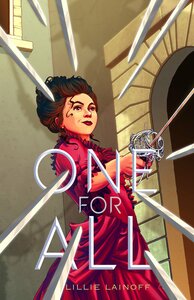Take a photo of a barcode or cover
One of my most anticipated reads of this year and what an absolute gift it is to finally have been able to read it! It’s impossible to fully describe how much a book like this means and how incredibly happy I am that it exists. One for All by Lillie Lainoff gives us the chronically ill protagonist I have dreamed of reading about and I adored following Tania’s story. She is such an incredible character and I also loved the characters in the world that surrounded her, the friendship and bond between Tania and her fellow musketeers had so much heart and the way that they supported one another was one of my favourite parts of the book. I loved Lainoff’s writing and how it truly immerses you in the historical setting, perfectly balancing the mystery of the plot with the brilliantly intriguing characters all of whom pull you deeper into the heart of the novel, instantly sweeping you up into their adventure. I listened to the audiobook and the narration by Mara Wilson was so brilliant, though I’ll definitely also be getting a physical copy too to treasure this wonderful book!
The fact that this is a book about a chronically ill protagonist and is written by a chronically ill author means the entire world. This is the kind of book I am always longing for as a chronically ill reader and I am beyond happy One for All exists and is out in the world for all to read. Though my chronic illness is not POTS, I identified so much with Tania and I’m so glad that this book fully represented what it is like to be chronically ill through Tania’s day to day life. It didn’t shy away from exploring the struggles of being chronically ill and living in an ableist world, nor was it ever a story that places an expectation on Tania to ‘overcome’ her disability. Instead, it showed what is and has always been true: that disabled girls can be the heroes of our own stories without having to sacrifice or hide any parts of ourselves. I’m so thankful to Lillie Lainoff for giving us this absolutely beautiful book with a protagonist like Tania, and I’m so happy for all the disabled teenagers who will get to grow up seeing themselves as the hero in this story.
I always find it hard to write reviews because it feels impossible to put into words how much books like this mean to me, but I wanted to try and get it across because I truly loved One for All and I am so grateful it exists. Books like this are what give me hope, both as a disabled reader and a disabled writer. Thank you, Lillie Lainoff
The fact that this is a book about a chronically ill protagonist and is written by a chronically ill author means the entire world. This is the kind of book I am always longing for as a chronically ill reader and I am beyond happy One for All exists and is out in the world for all to read. Though my chronic illness is not POTS, I identified so much with Tania and I’m so glad that this book fully represented what it is like to be chronically ill through Tania’s day to day life. It didn’t shy away from exploring the struggles of being chronically ill and living in an ableist world, nor was it ever a story that places an expectation on Tania to ‘overcome’ her disability. Instead, it showed what is and has always been true: that disabled girls can be the heroes of our own stories without having to sacrifice or hide any parts of ourselves. I’m so thankful to Lillie Lainoff for giving us this absolutely beautiful book with a protagonist like Tania, and I’m so happy for all the disabled teenagers who will get to grow up seeing themselves as the hero in this story.
I always find it hard to write reviews because it feels impossible to put into words how much books like this mean to me, but I wanted to try and get it across because I truly loved One for All and I am so grateful it exists. Books like this are what give me hope, both as a disabled reader and a disabled writer. Thank you, Lillie Lainoff
Enjoyed the concept of female musketeers, but I wanted more action. More intrigue, spying, fighting, and courtroom drama. There was way too much "I'm not good enough" whining for me. I'm okay with Tania slowly coming into her power and strength - but it was the main focus of the book and I wanted to see more of the girls working together to solve the mystery. The villain was very predictable.
I absolutely adored this book. When I heard there was going to be a YA book with own-voices POTS representation, I RAN to request an ARC. And let me tell you, it did not disappoint!
As someone who has POTS (postural orthostatic tachycardia syndrome), I've never seen myself represented anywhere in media, but this book changed that, and I'm so glad that it was excellently written. The author did a great job of showing how POTS affects people in every day life, and how it is a constant source of fatigue, even on a better health day. Tania's symptoms were talked about every day, not just used for dramatic effect or when convenient, which I was thankful for. I loved how Tania was still able to be a strong, successful musketeer despite her illness, and that she found people who supported and cared for her (believe me, it can be hard). This is definitely some of the best chronic illness representation I've read.
The actual plot itself was interesting, I enjoyed the action and mystery, along with the subplot of romance. The plot twists kept me on edge and very quickly I found that I just couldn't put this book down!
Overall, a great historical gender-bent 4 musketeers retelling with fantastic chronic illness representation. I highly recommend.
Thank you to the author, Lillie Lainoff, and Netgalley for providing me with a copy to review.
As someone who has POTS (postural orthostatic tachycardia syndrome), I've never seen myself represented anywhere in media, but this book changed that, and I'm so glad that it was excellently written. The author did a great job of showing how POTS affects people in every day life, and how it is a constant source of fatigue, even on a better health day. Tania's symptoms were talked about every day, not just used for dramatic effect or when convenient, which I was thankful for. I loved how Tania was still able to be a strong, successful musketeer despite her illness, and that she found people who supported and cared for her (believe me, it can be hard). This is definitely some of the best chronic illness representation I've read.
The actual plot itself was interesting, I enjoyed the action and mystery, along with the subplot of romance. The plot twists kept me on edge and very quickly I found that I just couldn't put this book down!
Overall, a great historical gender-bent 4 musketeers retelling with fantastic chronic illness representation. I highly recommend.
Thank you to the author, Lillie Lainoff, and Netgalley for providing me with a copy to review.
Tania’s father was a musketeer and she grew up fencing and trained to be strong despite her unexplained dizzy spells and weakness. When her father unexpectedly dies, she’s shipped off to what she believes is a finishing school but is really a school for female musketeers dressing in ball gowns with swords concealed under petite coats. Tania finds a new family in her fellow musketeers, their mentor and her nephew. But when her target may be connected to her father’s death, she must toe the line between duty, honor, and revenge. All for one or one for all?
adventurous
emotional
mysterious
medium-paced
Plot or Character Driven:
A mix
Diverse cast of characters:
Yes
I'm back on the Novelist appeal factor trolley (with my occasional interjections)! I was surprised by how charmed I was by this one. It's a tad overlong but otherwise well-paced. Perhaps the fact that I don't really remember anything about the original Three Musketeers helped me see this as its own thing.
Genre: Adventure, Historical, Spy fiction
Storyline: Plot Driven, Character Driven (What? It can’t be both?)
Tone: Suspenseful
Character: Strong female, Courageous, Ability diverse
Writing Style: Engaging, compelling
Themes: Shadow organizations, Living with an (in)visible disability, Coping with death, Chosen family
Other appeal factors:
Background lesbians
Finishing school as a cover for something way better
Hiding pointy things in elaborate dresses (my favorite female assassin/spy trope)
Muskateers! (but not a retelling, more of a companion story or reimagining)
Sisters before misters
Strong "Hello, my name is [insert name], you killed my father, prepare to die" Energy
Genre: Adventure, Historical, Spy fiction
Storyline: Plot Driven, Character Driven (What? It can’t be both?)
Tone: Suspenseful
Character: Strong female, Courageous, Ability diverse
Writing Style: Engaging, compelling
Themes: Shadow organizations, Living with an (in)visible disability, Coping with death, Chosen family
Other appeal factors:
Background lesbians
Finishing school as a cover for something way better
Hiding pointy things in elaborate dresses (my favorite female assassin/spy trope)
Muskateers! (but not a retelling, more of a companion story or reimagining)
Sisters before misters
Strong "Hello, my name is [insert name], you killed my father, prepare to die" Energy
Spoiler
It was kinda obvious how the muder of Tania’s father and the plot against the King were going to dovetail, but I didn’t mind that. It made for satisfying reading.
This story fell flat for me. I couldn’t wait to finish it. I liked the premise of the story of female Musketeers, but I felt the plot was too predictable and dragged in parts. I would have liked more sword fighting than the constant remarks about the main characters' ailments. I understand that part of her story was for her to learn to move past her physical challenges and to not allow it to define her, but it was mentioned soooooo much.
Lovely disability representation in a gender bent three musketeers story!
I think it’s a super cool idea, with the main character being the daughter of a musketeer and having three girl musketeers to fight with! In addition, she has POTS and I think it’s great to have representation of any disabilities, especially ones that are less talked about. There were also a few really good scenes that I couldn’t stop reading, but for the majority of this book I was just kind of bored. I never really got into it and I kind of had to force myself to finish. The whole pretense is neat though! (There’s also LGBTQ+ rep :)
I think the main reason I wasn’t super into this is because it’s more mystery than action and I’m not super into mystery novels. Also I kept getting all the names mixed up in my head and some of the topics just felt forced into the plot.
I think the main reason I wasn’t super into this is because it’s more mystery than action and I’m not super into mystery novels. Also I kept getting all the names mixed up in my head and some of the topics just felt forced into the plot.
TW/CW: ableism, blood, murder, loss of a loved one, past mention of sexual assault
Good disability representation—especially in YA—seems to only happen once in a blue moon. So I was so happy to find this book—a feminist historical fiction book written by a disabled author, no less! And while I did have a few problems with the story overall, One for All was no doubt a fantastic debut!
First things first—disability rep! While I can’t speak to the accuracy, Lillie Lainoff (the author) has the same chronic illness as Tania—Postural Orthostatic Tachycardia Syndrome (POTS)! Disabled representation from disabled voices always makes my heart so happy! For me, it’s even better that One for All is a historical fiction piece; most books with disabled characters only exist in contemporary/realistic fiction books, and I adamantly believe that disability rep in genres like historical fiction, fantasy, and science fiction is just as important, if not more important; it’s crucial for disabled readers to know that they don’t only exist in modern realistic fiction realities—they have always existed in history, and they can exist in fantasy and sci-fi worlds as well. One for All did a fantastic job at detailing all the aspects of Tania’s POTS and how it affected her daily life, from her routine to her social interactions and childhood. So many chronically ill readers will be able to see themselves in Tania, and that, to me, is immensely impactful.
Beyond that, One for All is fiercely feminist! It’s set in France in the 1600s, and the themes of empowerment and sisterhood ran deeply through it. Throughout most of the book, Tania struggles with her place in the world as a disabled woman in a time where both are frowned upon, but her journey for self-empowerment is one that is sure to resonate with so many readers. Although some of the other students don’t treat Tania with the respect she deserves at first, there are themes of recognizing and correcting your previous ableism. The friendship that Tania eventually shares with the rest of the fellow L’Academie des Marieés students is wonderfully tender and strong, and it makes for an incredibly empowering novel overall.
As much as I loved the aforementioned aspects, however, there were a few aspects of One for All that I didn’t like as much. For the most part, I liked the writing style well enough; Lainoff’s prose flowed well and was appropriately descriptive when the time called for it. However, Lainoff’s style tended to fall towards the over-the-top side of the spectrum. I could let it slide in most instances—it fit with the mood and tone of the book in general—but in some cases, it felt overly purple and theatrical. It had a dramatic feel to it, and while it fit the classic retelling tone at times, it felt superfluous in other cases.
Additionally, I wasn’t quite as invested in the assassination part of the plot as I was in the rest of the book. Seeing as that (after Tania’s father’s murder) was the main driving force to the plot, it didn’t come through all the way; it was overshadowed by more mundane character interactions (which I did like), and as a result, felt rushed and oversimplified. For something that was supposed to be the primary inciting incident of the second half of the book or so, it felt more like a subplot than anything. As a result, I felt my mind wandering a bit during these parts, but it didn’t take me out of the book entirely.
All in all, a feminist retelling with a disabled heroine who all readers will want to cheer on. 3.75 stars, rounded up to 4!
Good disability representation—especially in YA—seems to only happen once in a blue moon. So I was so happy to find this book—a feminist historical fiction book written by a disabled author, no less! And while I did have a few problems with the story overall, One for All was no doubt a fantastic debut!
First things first—disability rep! While I can’t speak to the accuracy, Lillie Lainoff (the author) has the same chronic illness as Tania—Postural Orthostatic Tachycardia Syndrome (POTS)! Disabled representation from disabled voices always makes my heart so happy! For me, it’s even better that One for All is a historical fiction piece; most books with disabled characters only exist in contemporary/realistic fiction books, and I adamantly believe that disability rep in genres like historical fiction, fantasy, and science fiction is just as important, if not more important; it’s crucial for disabled readers to know that they don’t only exist in modern realistic fiction realities—they have always existed in history, and they can exist in fantasy and sci-fi worlds as well. One for All did a fantastic job at detailing all the aspects of Tania’s POTS and how it affected her daily life, from her routine to her social interactions and childhood. So many chronically ill readers will be able to see themselves in Tania, and that, to me, is immensely impactful.
Beyond that, One for All is fiercely feminist! It’s set in France in the 1600s, and the themes of empowerment and sisterhood ran deeply through it. Throughout most of the book, Tania struggles with her place in the world as a disabled woman in a time where both are frowned upon, but her journey for self-empowerment is one that is sure to resonate with so many readers. Although some of the other students don’t treat Tania with the respect she deserves at first, there are themes of recognizing and correcting your previous ableism. The friendship that Tania eventually shares with the rest of the fellow L’Academie des Marieés students is wonderfully tender and strong, and it makes for an incredibly empowering novel overall.
As much as I loved the aforementioned aspects, however, there were a few aspects of One for All that I didn’t like as much. For the most part, I liked the writing style well enough; Lainoff’s prose flowed well and was appropriately descriptive when the time called for it. However, Lainoff’s style tended to fall towards the over-the-top side of the spectrum. I could let it slide in most instances—it fit with the mood and tone of the book in general—but in some cases, it felt overly purple and theatrical. It had a dramatic feel to it, and while it fit the classic retelling tone at times, it felt superfluous in other cases.
Additionally, I wasn’t quite as invested in the assassination part of the plot as I was in the rest of the book. Seeing as that (after Tania’s father’s murder) was the main driving force to the plot, it didn’t come through all the way; it was overshadowed by more mundane character interactions (which I did like), and as a result, felt rushed and oversimplified. For something that was supposed to be the primary inciting incident of the second half of the book or so, it felt more like a subplot than anything. As a result, I felt my mind wandering a bit during these parts, but it didn’t take me out of the book entirely.
All in all, a feminist retelling with a disabled heroine who all readers will want to cheer on. 3.75 stars, rounded up to 4!










